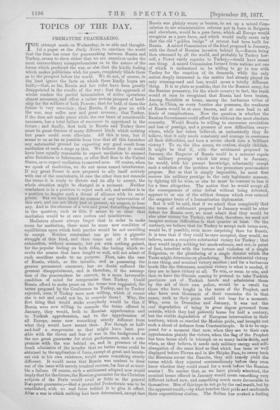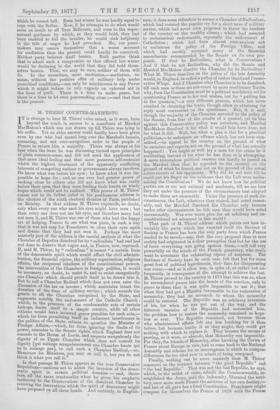TOPICS OF THE DAY.
PREMATURE PEACEMAKING.
THE attempt made on Wednesday, in so able and thought- ful a paper as the Daily News, to convince the world that the time has come for peacemaking between Russia and Turkey, seems to show either that we are ourselves under the most extraordinary misapprehensions as to the nature of the forces which produced the war, or else that the kindly feeling which makes politicians wish for peace, completely blinds them as to the prospect before the world. We do not, of course, in the least ignore the facts on which these kindly hopes are built,—that, so far, Russia and her ruler have been greatly disappointed in the results of the war ; that the approach of winter renders the partial intermission of active operations almost necessary, and offers a rather serious prospect of hard- ship for the soldiers of both Powers ; that for both of them the future is very uncertain ; that Russia, if she goes on with the war, may suffer new and great reverses ; that Turkey, if she does not make peace while she can boast of considerable successes, has a total failure of resources to apprehend in the future ; and finally, that both in Russia and Turkey there must be great distress of many different kinds which nothing but peace could even alleviate. All this is true, but it seems to us as far as possible from true that all this furnishes any substantial ground for expecting any good result from mediation at such a gage as this. We believe that it would have been equally reasonable to expect mediation to succeed after Balaklava or Inkermann, or after Bull Run in the United States, as to expect mediation to succeed now. Of course, when we speak of mediation, we do not mean armed interference. If any great Power is now prepared to ally itself actively with one of the combatants, in case the other does not concede the terms it is ready to dictate and its ally to accept, the whole situation might be changed in a moment, Neither combatant is in a position to reject such aid, and neither is in a position to despise such a threat of alliance with its anta- gonist. But we have heard no rumour of any intervention of this sort, and are not likely just at present, we suspect, to hear any. And in the absence of a new and great disturbing element in the question, such as this, it seems to us clear that mediation would be at once useless and mischievous.
Mediators almost always forget that in order to make room for mediation, there must be some new condition of equilibrium open which both parties would be not unwilling to accept. Neither combatant can go into a gigantic struggle of this kind, and then come out of it without exhaustion, without necessity, but yet with nothing gained, for the popular feeling on both sides, the feeling which re- cruits the armies that have fought so well, will not admit of such sacrifices made to no purpose. First, take the case of Russia, which, as the invader, and as possessing the greater permanent resources, has no doubt suffered the greatest disappointment, and is therefore, if the assump- tion of the peacemakers be correct, in a more favourable condition of mind for compromise than Turkey. Could Russia afford to make peace on the terms now suggested, the terms proposed by the Conference to Turkey, and by Turkey rejected, even if Turkey were now willing, which of course she is not and could not be, to concede them I Why, the first thing that would strike everybody would be that if Russia were now willing to concede the terms offered in January, they would, both to Russian apprehension and to Turkish apprehension, and to the apprehension of all Europe, mean now something utterly different from what they would have meant then. For though so half- and-half a compromise as that might have been pos- sible with the threat and fear of war in the background as the one great guarantee for strict performance, such a com- promise with the war behind us, and in presence of the frank admission of the invader that no better terms could be obtained by the applicatien of force, except at great and immin- ent risk to his own existence, would mean something utterly different. It would mean that Russia was content to draw out of the issue with merely nominal success, for fear of so terri- ble a failure. Of course, such a settlement adopted now would imply that for the future, the Russian guarantee for the Christian subjects of the Porte would avail as little as the general European guarantee,—that a pretended Protectorate was to be established, with no real force behind it to give it effect. After a war in which nothing had been determined, except that Russia was plainly weary or beaten, to set up a mixed Com- mission to see administrative reforms put in force in Bulgaria and elsewhere, would be a pure farce, which all Europe would. recognise as a pure farce, and which would really mean only that the old "golden bridge" of retreat had been built for Russia. A mixed Commission of the kind proposed in January, with the dread of Russian invasion behind it,—Russia being then esteemed by all the world, and probably by Turkey her- self, a Power vastly superior to Turkey,—would have meant one thing. A mixed Commission formed from nations not one of which is understood to be willing to go to war with Turkey for the exaction of its demands, while the only nation deeply interested in the matter had already played its only winning-card and lost, would mean a totally different thing. It is as plain as possible, that for the Russian army, for the Russian peasantry, for the whole country in fact, the truth would at once be recognised that Russia had been beaten.
Among Socialists at home, among the barbarous tribes of Asia, in China, on every frontier she possesses, the weakness of Russia would be at once known, and at once lead to all.
kinds of complications. Now the question is whether the Russian Government could afford this without the most absolute necessity. Would Russia be willing to encounter revolution and lose of prestige, and a pressure of new difficulties every- where, while her rulers believed, as undoubtedly they do believe, that it only needs constancy and courage to overcome all their difficulties, and turn a severe check into a brilliant, victory ? To us, the idea seems, we confess, simply childish..
It might be that if, with the settlement proposed in January, the Emperor of Russia could in a moment regain the military prestige which his army had in January, he would, with his present knowledge, reluctantly accept such a solution of the problem as the premature peacemakers propose. But as that is simply impossible, he must first recover his military prestige in the only legitimate manner, by fighting till he wins, or else he must be content to lose it for a time altogether. The notion that he would accept all the consequences of utter defeat without being defeated, appears to us one of the wildest dreams which ever entered the sanguine brain of a humanitarian diplomatist.
But it will be said, that if we admit thus completely that the terms of settlement proposed in January would be utter defeat for Russia now, we must admit that they would be also utter victory for Turkey, and that, therefore, we need not imagine serious difficulties in that quarter at least. On the contrary, we believe that for Turkey to accept such terms now, would be, if possible, even more surprising than for Russia. It is true that if they could be once accepted, they would, we believe, mean a complete substantial victory for Turkey ; that they would imply nothing but mock-reforms, and not, in point of fact, interfere with the torture and violation of a single Bulgarian, or the plundering of a single district which the Turks might determine on plundering. But substantial victory is one thing, and nominal victory another ; and for a barbarous horde like the Ottomans, nominal victory is what is needed, if they are to have victory at all. To win, or seem to win, and then to have the Gia.ours coming to pretend to take Turkish provinces out of Turkish hands and administer them by the aid of their own police, would be a result for those who have fought in the name of the Prophet, and who have seen thousands of their comrades die in that name, such as their pride would not bear for a moment. Why, even in December and January, it was not the real degradation of being in great degree governed from outside, which they had patiently borne for half a century, but the visible degradation of European intervention in their territory, which so startled the Moslem pride, and brought out such a shout of defiance from Constantinople. Is it to be sup- posed for a moment that now, when they are to their own apprehension plainly the victors, when the flag of the Prophet has been borne aloft in triumph on so many battle-fields, and when, as they believe, it needs only military energy and self- abnegation of the same kind as that which has been so well displayed before Plevna and in the Shipka Pass, to sweep back the Russians across the Danube, they will tamely yield the terms which they rejected contumeliously before they even knew whether they could stand for a week before the Russian armies ? No matter that, as we have plainly admitted, the nominal terms offered in January would mean something very different indeed now, and something much more favourable to themselves. Men of this type do not go by the real result, but by the apparent result,—by what touches their pride and confounds their superstitious elation. The Sultan has evoked a feeling which he cannot lull. Even last winter he was hardly equal to cope with the Softas. Now, if he attempts to do what would seem an insult to all True 13elievere, and even to the super- natural guidance by which, as they would hold, they had been enabled to foil the invader, he would sink helplessly in the tide of anger he had provoked. No, our peace- makers may assure themselves that a worse moment for mediation than the present could hardly be conceived. Neither party believes itself beaten. Both parties think that to admit such a compromise as that offered last winter would be declaring to the world that they did hold them- selves beaten. That, we may be sure, neither of them will do, In the meantime, mere mediation,—mediation, we mean, without the positive offer of military help under prescribed conditions,—can only be mischievous to any Power which it might induce to rely vaguely on external aid in the hour of peril. There is a time to make peace, but there is a time to let even peacemaking alone ;—and that time is the present.



































 Previous page
Previous page